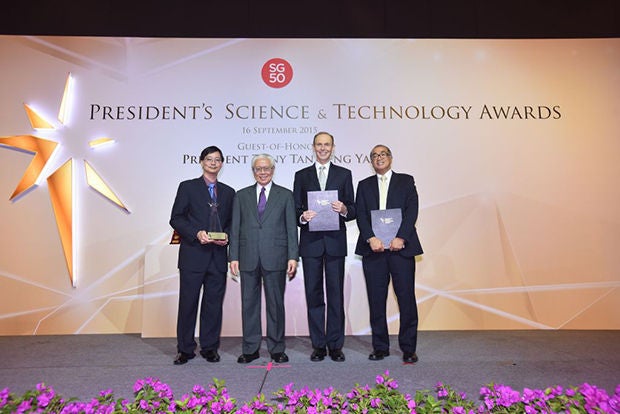
SINGAPORE — First, they identified a specific molecular signature of a form of urinary tract cancer associated with exposure to aristolochic acid, a carcinogen found in a plant common in supplements consumed in Taiwan.
This allowed them to determine that this carcinogen is also the cause of other cancers, found not just in Taiwan, but in other parts of China, Singapore and even the United States.
Discoveries like these about Asian cancers — of which little is yet understood — have earned Professors Patrick Tan, Teh Bin Tean and Steven Rozen of Duke-NUS Graduate Medical School the President’s Science Award, which is among the President’s Science and Technology Awards given out this year in recognition of achievements in science and technology in Singapore.
The World Health Organisation estimates that, by 2030, 70 per cent of the world’s cancer deaths will occur in Asia and developing countries. But Asian cancers differ from those found in Western countries and little is known about their underlying molecular genetics.
Recognising the urgency of research in this area, the trio have collaborated over the past eight years to find information to diagnose, treat and possibly prevent cancers in the future. Their findings have been published in the Science Translational magazine and attracted international interest from other publications such as the HK South China Post and Cai Jing.
Another key discovery is their identification of mutated genes in breast fibroepithelial tumors, the most common benign breast tumor in young women. They discovered that the tumor was caused by genetic mutations that occurred at specific point of a gene known as MED12, which they term a “hot spot”.
Working with Professor Tan Puay Hoon of Singapore General Hospital pathology department, they hope to extend what they have discovered to other breast fibroepithelial tumours, and create “customised diagnostic panels and (push) it towards clinical application and commercialisation”.
The professors attributed their success to their “team-science” approach. Professor Patrick Tan said at a media briefing yesterday: “One of the emerging challenges is to use the success of awards like the (President’s Science Award) to try to encourage the next generation to embrace this idea of team science...I think the problems we have today are the sort that we really need team effort.”
Five top scientists and engineers were given awards by President Tony Tan yesterday (Sept 16). Four young researchers also received the Young Scientist Awards, which are organised by the Singapore National Academy of Science and supported by A*STAR.
Among the winners of the Young Scientist Awards was Dr Wan Yue, who was recognised for her research on using RNA structure analysis to identify new drug targets in pathogens. Dr Wan, 32, was also the first Singaporean to win the Society in Science-Branco Weiss fellowship from Switzerland.
RNA research is key in combating bacteria that are resistant to drugs. In Europe alone, at least 25,000 patients die every year due to infections caused by drug resistant bacteria. A rise in these infections have been noted in Asia as well. However, few drugs are under development due to the lack of research in RNA structures.
Despite many uncertainties, Dr Wan managed to discover and develop a method for studying RNA shapes in microorganisms. Dr Wan said: “People have been telling me for two years that it’s not going to work, that it would never ever work. So when it worked we were extremely happy.”
With her research, Dr Wan hopes to generate tools like RNA sensors for clinical and industrial use. “I think it’s extremely exciting, because I feel like we’re just at the beginning of understanding of how RNA functions in a cell. With these new tools and new approaches, very likely we’ll have breakthroughs in our understanding of RNA functions in the next five to 10 years,” she said.
Despite her many achievements in the scientific world, Dr Wan’s personal goal is a modest one. “I just want a normal, happy, simple family. I have a child that I hope to spend time with more, to grow old together.”













 Get it on Google Play
Get it on Google Play